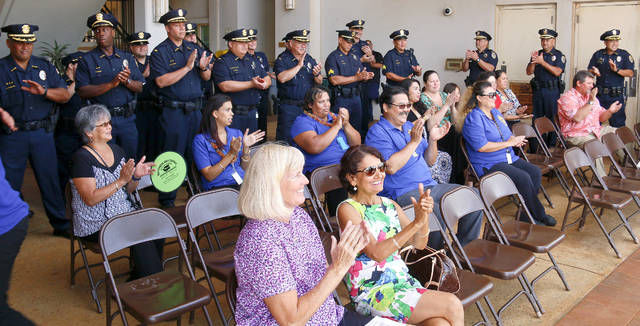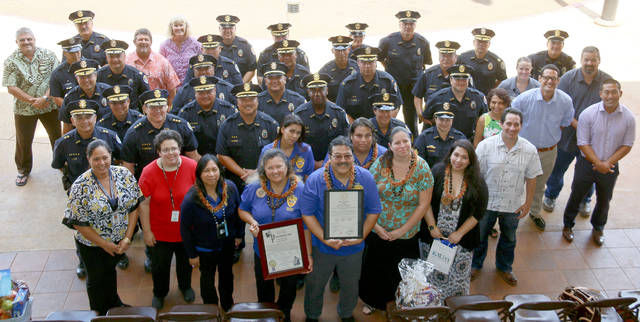LIHUE — Lavina Taovao said she wanted to become a 911 dispatcher because she wanted to save lives.
And in her job, key to saving lives is staying calm,
“I don’t get excited. If you get excited, it’s going to make the caller get excited,” said Taovao, a 12-year veteran dispatch officer for the Kauai Police Department.
On Monday, the 17 dispatchers on Kauai were honored as unseen heroes in recognition of National Public Safety Telecommunications Week, which started Monday.
“Not many people know what an emergency dispatch officer is and what their duties are. They have a very important role in emergency services, and yet it’s a very low-key profession,” said Kennison Nagahisa, KPD dispatch lieutenant. “They help people in their communities, and they don’t seek recognition. It takes a very special person to be a dispatcher, and it’s a job not everyone can do.”
On Kauai, there are three platoons of dispatchers and there are three to four to a shift. One person is responsible for dispatching the fire department and another is in charge of dispatching police officers. The others on the shift take non-emergency calls and provide backup for those responsible for the emergency calls, Nagahisa said.
Mel Rapozo, chair of the Kauai County Council, used to work as a dispatcher and KPD officer. He said working as a dispatcher is harder than being a councilmember.
“It’s very hard for anyone who hasn’t done it to understand what it’s like to have someone on the other end of the phone screaming at you and blaming you for their bad day,” he said. “Because no one ever calls dispatch to tell them how good they have it.”
When calling 911, there are four key pieces of information the dispatcher needs: Location, a callback number, nature of call and name. The caller also needs to listen for instructions and stay on the line until they are instructed that it is all right to hang up.
It’s also important for callers to remember that as they are talking to a dispatcher, help is already being sent to them, Nagahisa said.
“A lot of times, cops get the credit, but a lot of people don’t know what happens in the time between the call and when officers arrive. That’s the gap you fill, and it’s an important gap,” Rapozo said.
Since Jan. 1, there have been 13,431 calls to the dispatch center on Kauai, said Sarah Blane, county spokeswoman.
In Hawaii, people can also reach 911 via text, which can be used in situations where it isn’t safe to place a phone call, bad reception, or if a person is unable to speak due to a medical emergency.
Taovao, a dispatch supervisor, said she’s gotten service calls from rescues and suicides to a difficult labor and delivery.
“The baby was born with a blue face,” she said.
Because her job involves intense and emotional situations, Taovao said it’s important to keep work at the office.
“If you don’t do that, you’re not going to survive,” she said.



